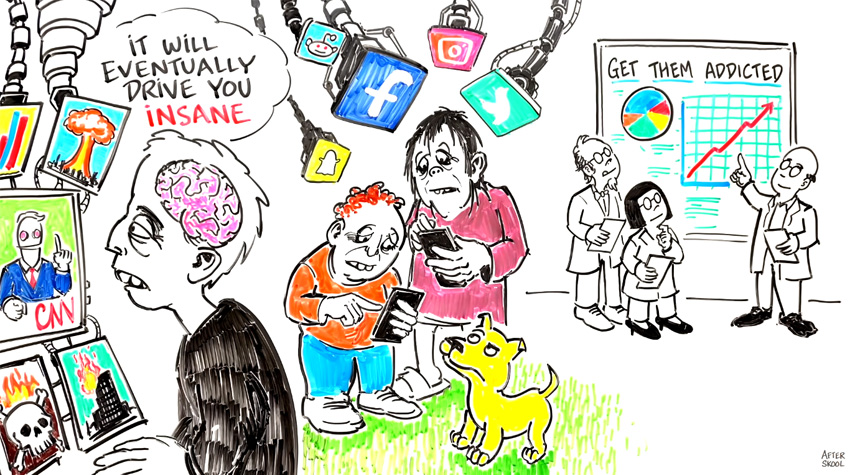 by Chris Banescu –
by Chris Banescu –
Our brains are not designed to be constantly flooded and overloaded with information. Our brains are not engineered for continual stimulation. Our brains are not meant to be constantly distracted. Unfortunately, modern technologies, applications, and platforms using globally connected networks instantly deliver to us nearly-infinite choices and opportunities to continually stimulate, entertain, distract, and addict us.
Many of our modern struggles are diseases of abundance and constant distractions. We suffer from information overload. Too much information from too many sources is coming at us too fast. “Our brains are busier than ever before. We’re assaulted with facts, pseudo facts, jibber-jabber, and rumour, all posing as information,” cautions neuroscientist Daniel J. Levitin (see The Organized Mind book). We deal with it at work, in our businesses, and at home. Even friends and family members contribute to this process when they send us articles, photos, stories, videos, and breaking news.
The ready availability of smartphones and other mobile devices means we are continually connected to the floodgates of information. We are being bombarded by auditory and visual stimulation, novelty, news, products, services, entertainment, and games designed to enslave us, isolate us, and alienate us from reality and God. All of this will eventually destroy us, if we allow ourselves to be manipulated and enslaved this way.
Our brains cannot handle it all. It’s impossible to take in and process all this information. “The human brain is not designed to absorb all the world’s breaking news, 24/7 emergencies injected straight into your skull with clickbait headline news. If you pay attention to that stuff, even if you’re well-meaning, even if you’re of sound mind and body, it will eventually drive you insane,” warns Naval Ravikant in a podcast interview with Joe Rogan (see video below).
Ravikant explains how technology and social media companies weaponize their platforms to target us. They intentionally misuse their scientific and technological knowledge to attract and distract us; to addict us; to make us dependent on the constant mental stimulation and distractions they readily provide. “You have social statisticians and scientists and researchers, people in lab coats—literally best minds of our generation—figuring out how to addict you to the news,” he cautions. Their methods are no different than what drug dealers do; instead of concocting more potent and exotic drugs, they misuse technology to lure us into addictive behaviors.
We may not realize just how dependent we have become on this constant mental stimulation. We’re in a perpetual state of information overload, but we’ve become accustomed to overstimulation. We’ve conditioned ourselves to continually digest information. We’re addicted to novelty and entertainment.
Too much of anything is always bad for us. It’s no different with too much information, even if some of it is useful and wholesome. Consuming excessive amounts of interesting, educational, and even motivational materials, can overwhelm our brain and negatively impact our mind and soul.
Once the habit is formed, we engage in the information-seeking behavior effortlessly and automatically. It becomes part of our daily routine. Every waking minute or every day we’re continually absorbing and sharing information.
We constantly check our computers, phones, and other mobile devices. We continually use various mobile apps to text, email, post, message, and share all sort of information with others. We constantly check news sites or scroll through Twitter, Instagram, Facebook, or TikTok. We browse through endless streams of updates and gorge on information.
We often distract or entertain ourselves with novel information to “relieve” stress, when in fact the relief is only temporary. Longer term this behavior increases our stress and anxiety. The information flood overwhelms the brain. It drains our energy and exhausts our minds. It leads to emotional fatigue. It undermines our cognitive abilities. It saps our creativity. It destroys our productivity. It leads to poor decision-making. It facilitates impulsive behavior.
In worst cases, information addiction can eventually lead to destructive behavior. It can isolate us from genuine relationships and real life. It will disquiet our soul. It will lead to depression or despair. It will alienate us from God. It will destroy our humanity. It will drive us insane if we allow it.
The right solution to this mess is to stop this madness as soon as possible. The quicker you can stem the flood of information you consume daily, the better. If you can’t quit cold turkey, then begin to gradually reduce the amount of information you digest daily.
Limit the amount of time you spend online and on your phone. Stay off social media. Reduce the number of articles, posts, news items, and texts you read daily. Decrease the volume of photos, videos, clips, and movies you view every day. Ignore your phone for a few hours every day; turn it off if you have to. Get away from your computer for at least a few hours each day.
Spend at least 30 minutes in silence every day. Work on silencing your thoughts. Give your brain time to rest. Allow you mind to quiet down. Let your soul be calm and find peace. Take time to reflect and think deeply.
Create calm and healthy spaces in your daily life. Give your body time to relax and recharge. Get your body moving. Go for a walk. Exercise. Run, hike, bike, swim. Engage in meaningful conversations with close friends and family members. Spend time and play with your pets; or find opportunities to be around other animals.
Go outside. Spend time in nature daily. Bask in the sun. Smell the rain. Watch the sky and the clouds. Breathe in fresh air. Smell the flowers. Listen to bird songs. Observe the birds, the bees, and the butterflies. Enjoy the beauty and majesty of the vibrant life that’s all around us.
Work with your hands. Engage in creative physical activity. Build or repair something. Wholesome physical work ennobles the soul and quiets the mind. Find things to fix and improve around your home. Work in your yard, your garage, or your garden. Clear the clutter and organize your living spaces. Bring order and create beauty all around you. You will feel better and your head will be clearer. External order facilitates internal order.
Finally, take care of your spiritual life. Seek God’s wisdom and presence daily. Read His word and the wisdom of His saints as often as possible. Pray and meditate regularly. Worship the Lord as appointed by your faith. You’ll need God’s help to fight this daily battle. You will need His power to regain your inner peace and restore normality in your life.
(Photo credit After Skool)


